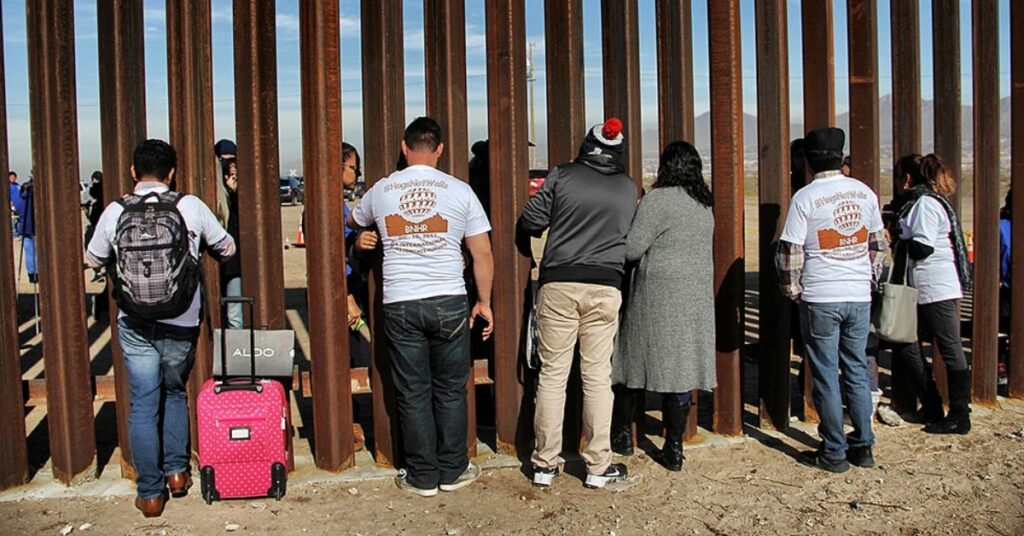Migrants who sneaked into the U.S. Friday night under a full moon and in water up to their waists were devastated to hear that they might be sent back to Mexico because the rules for seeking asylum have changed.
About 200 migrants walked for about an hour in the dark to turn themselves into Border Patrol agents in Yuma, Arizona. Many of them were Cuban, and they were shocked to hear that a ban on asylum that used to mostly affect people from other countries now applies to them as well. Several of them were political opponents of the Cuban government. They left because they were afraid of being jailed and persecuted and because they were desperate for money.
President Joe Biden said on Thursday that Cubans, Nicaraguans, Haitians, and Venezuelans who illegally enter the U.S. will be sent to Mexico. This will start right away. At the same time, he said that up to 30,000 people, a month from these four countries could get humanitarian parole if they applied online, paid for their own flights, and found a financial sponsor.
Mario Enrique Perez, who is 32 years old, said he would rather be locked up in the U.S. than go back to Mexico, where he and his wife were treated badly during a two-month trip across the country. They often had to get off the bus to avoid getting ripped off at government checkpoints, which slowed them down.
Most Cubans get to the U.S. by flying as tourists to Nicaragua and then making their way to the U.S.-Mexico border. Perez said that they talk about the safest and easiest routes “like ants,” which is why he chose Yuma.
Nelliy Jimenez, who is 50 years old, said that she rode horses on her three-month trip through Mexico because she didn’t want to get ripped off at government checkpoints. Her son, who she said was an active rebel, ran away to Spain a long time ago. She stayed in Cuba even though she had ties to her son. She was even arrested during the July 2021 protests, but she didn’t leave until she had to sell her convenience store in the city of Cienfuegos to pay for her trip to the U.S.
She wants to move to Nebraska to live with her family. Jimenez said of the new limits on asylum, “I did not see this coming.” Niurka Avila, who is 53 years old, said that she and her dissident husband are being watched by the Cuban government.
She said that she didn’t like Cuban officials and couldn’t wear a traditional guayabera dress because they did. She said that they “took” it. Avila, a nurse in Cuba, said that Mexico wasn’t a good choice and that she and her husband want to move to Florida to be closer to family. “This country is dangerous, and our family lives here,” she said.
The new rules add to an effort that started in October to stop Venezuelans from trying to enter the U.S. Since then, the number of Venezuelans coming to the southern border has dropped by a lot. Together, they make a big change to immigration rules that will stay in place even if the Supreme Court throws out a public health law from the Trump administration that lets U.S. authorities turn away people who are looking for asylum.
“Don’t just show up at the border,” Biden said when he announced the changes, even though he knew that many families had to make the dangerous trip north because of hard times. “Stay where you are and try to do things legally from there,” he told her.
Biden made the announcement just a few days before his first trip as president to the southern border, which was set to take place on Sunday in El Paso, Texas. From there, he will go to Mexico City, where on Monday and Tuesday he will meet with North American leaders.
Since March 2020, migrants trying to seek asylum at the U.S.-Mexico border have been turned away 2.5 million times because of restrictions in Title 42. These restrictions were put in place as an emergency health measure by former President Donald Trump to stop the spread of COVID-19. But people have always said that the Republican Party used the restrictions as an excuse to close the border.
Biden tried to get rid of the restrictions in Title 42, but Republicans sued to keep them in place. For now, the U.S. Supreme Court has not changed the rules. White House officials say they still think the restrictions should be lifted, but they say that under immigration law, they can still turn away migrants.
On Friday, Boris Cheshirkov, a spokesperson for UNHCR, the U.N. agency for refugees, said that the agency was happy about the expansion of safe and regular pathways that will now be available to a “unprecedented number” of people trying to get into the U.S. He also said that the agency wants to know more about how the new process will work.
At a regular U.N. briefing in Geneva, he told reporters, “These are quite important and multifaceted announcements.” “We’re looking at what’s been said and how it might affect the situation and the thousands of people who are already on the move,” the president said.
Cheshirkov said that the U.N. agency has long been worried about the use of Title 42 because many people could be sent back to Mexico “without taking into account the dangers they were running from and the risks and hardships that many of them may then face.”
Please use the comments section to point us any errors you see so that we can correct them. Comment below if you liked this article. Also, keep checking back Journalistpr.com. with us for updates on the news.

